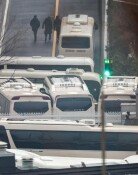Ruling-opposition agreement needed for special prosecutor bill
Ruling-opposition agreement needed for special prosecutor bill
Posted January. 10, 2025 08:41,
Updated January. 10, 2025 08:41
The Democratic Party of Korea reintroduced a bill on Thursday to enact special investigative laws concerning allegations of rebellion. The reintroduced bill requires the Chief Justice of the Supreme Court of Korea to recommend two candidates for the position of special prosecutor. It does not include a veto power that would allow the opposition to request a re-nomination if they are dissatisfied with the candidates recommended by the Chief Justice.
The bill, originally introduced and passed by the main opposition party, required all candidates for the special prosecutor to be recommended by the opposition. Acting President Choi Sang-mok vetoed the bill, citing unconstitutional "toxin clauses." It was subsequently rejected by the National Assembly, falling two votes short of the 200-vote quorum required for passage. Now that the most controversial toxin clauses have been removed, the People Power Party should cooperate to ensure its passage. While concerns remain about provisions that could lead to pretextual investigations or leaks of investigative secrets, the investigation’s scope and the special prosecutor's timeframe cannot be delayed any longer. If the special prosecutor candidates are recommended by the Chief Justice of the Supreme Court and the proposal is reintroduced to the National Assembly, the two-vote deficit is likely to be easily overcome.
The power to investigate insurgencies was transferred to the police under the former Moon Jae-in administration through the adjustment of investigative powers between prosecutors and the police. However, the prosecutor's office has jumped in under the pretext of investigating abuse of authority, targeting the defense minister and military leaders. In contrast, the police, which hold the authority to investigate acts of rebellion, only investigated the Minister of the Interior and Safety as well as police leaders. Subsequently, the Corruption Investigation Office for High-ranking Officials exercised its referral rights to the Prosecutors’ Office and the police. However, since the agency referred the case under the category of abuse of authority, lacking authority to investigate rebellion, it also sparked controversy.
The need for a joint investigation involving the police was raised from the outset. However, the prosecutor's office proposed a joint investigation to the police only after the investigation was well underway, which the police refused. The agency invoked its power of referral to both the prosecutor's office and the police and proposed a joint investigation, but only the police accepted. The prosecutor's office, which lacks the authority to investigate the rebellion, transferred only the investigation of President Yoon Suk Yeol while retaining the rest of the investigation into relevant officials. The three investigative agencies appeared more focused on protecting their own status than on uncovering the essence of the crime.
Enacting special investigative laws on allegations of rebellion would address both the controversy over the prosecutors’ and the agency’s authority to investigate insurgency and concerns about the police's inability to lead an investigation despite having the authority to do so. A special prosecutor would also help avoid suspicions that might arise if prosecutors were to prosecute a president who is a former prosecutor. However, there is concern that introducing a special prosecutor could delay the completion of the rapidly progressing investigation due to competition between investigative agencies. Even if the special prosecutor law is passed, it would take about a month for the special prosecutor to be appointed. The ruling and opposition parties need to reach an agreement on enacting the special prosecutor law quickly.







